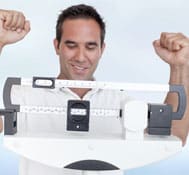Losing weight can be a challenging journey, and many people find themselves struggling to shed those extra pounds despite their best efforts. Even when eating less and moving more, some people simply don’t see the weight shift.
If you’re wondering why you’re having difficulty losing weight on a diet, several factors could be at play. That’s why here at Bodyline we want to help you explore some of the most common reasons why weight loss may be challenging and how medical weight loss programmes, like the ones offered at Bodyline, could help you overcome these obstacles in your weight health.
The Importance of Caloric Deficits
The most important thing to remember when embarking on a weight loss journey is the importance of a calorie deficit. Ultimately, weight loss comes down to consuming fewer calories than you burn going about your day, so that the body begins to burn the stored fat instead, leading to fat loss.
All fad diets are essentially different ways to be within a calorie deficit but are unsustainable thanks to their extreme rules.
Many people struggle to accurately track their caloric intake or may unknowingly consume more calories than they realize. Portion control, mindful eating, and tracking your food intake can help you create the necessary caloric deficit for weight loss.
The crux of medical weight loss programmes is that the safe diet pills or weight loss injections are effective appetite suppressants, working to curb your food cravings and hunger, thus leading to a calorie deficit that is much easier to maintain. They also provide holistic support and nutritional guidance to ensure you maintain a proper caloric deficit while still meeting your nutritional needs.
Genetics
Genetics play a significant role in our body’s composition and metabolism. Some individuals may have a genetic predisposition to store fat more easily or have a slower metabolic rate, making it harder to lose weight. While you can’t change your genes, understanding your how your genetics impact your fat loss can help to tailor your weight loss approach.
The Wrong Type of Exercise
Exercise is an essential component of any weight loss journey, but not all exercises are created equal. For example, focusing solely on cardiovascular exercises like running or cycling may burn calories but not necessarily lead to significant weight loss alone. Yet, this is what we have been told to do to lose weight!
Incorporating strength training exercises can help build lean muscle mass, which boosts your metabolism and promotes fat loss. Research has shown that combining ‘resistance training’, such as lifting free weights, using weight machines, and exercising with dumbbells with a reduction in calories has been found to be the most effective exercise for fat loss.
Medical weight loss programmes at Bodyline include support and guidance from experienced healthcare nurses who can help dispel all the most common weight loss misconceptions while supporting you through a journey to lose weight.
Hormonal Imbalances
Depending on the stage of your life, it can be down to your hormones that are causing you difficulty in losing weight. Women approaching perimenopause and the menopause find it particularly difficult to lose weight due to fluctuations and decreases in levels of oestrogen. Additionally, men over a certain age experience declines in testosterone levels which is linked to loss of muscle mass, leading to a lower metabolism and weight gain.
Luckily, there are avenues to take to alleviate these problems here at Bodyline, including medical weight loss treatments and bespoke hormone replacement therapy to regulate hormone levels and allow for effective weight loss at this stage.
Water Retention
Water retention can mask your weight loss progress and make it seem like you’re not losing weight, even if you’re doing everything right. Factors such as hormonal fluctuations, high sodium intake, and certain medications can contribute to water retention.
Water retention weight gain is temporary, but if you are finding this happens to you regularly you may benefit from speaking to your GP to get to the bottom of this. Causes may be down to changes in your kidneys, liver, and gut, or could be due to your contraception.
Hitting a Plateau
Weight loss plateaus are common and can be incredibly frustrating. After initial progress, you may find that your weight loss stalls, even if you’re following your diet and exercise plan diligently. Plateaus occur because your body adapts to the changes, and your metabolism slows down in response.
To overcome plateaus, it’s essential to make adjustments to your diet and exercise routine, like consuming fewer calories or increasing your physical activity. If you think you’ve been stuck in a plateau, Bodyline’s medical weight loss programmes have experienced healthcare professionals who can analyse your progress and provide strategies to help you break through them.
Contact Bodyline today to find out more about our hormone replacement therapy treatments
How Medical Weight Loss Programs Could Help You
If you’re struggling to lose weight on your own, Bodyline could provide the support and guidance you need. We offer a comprehensive, holistic approach to weight loss, exploring not only your diet and exercise levels but also other factors that may be hindering your progress. With prescriptions to medical weight loss treatments, supervision and personalized plans, you’ll receive individualized attention and ongoing support throughout your weight loss journey.
If you’re finding it challenging to lose weight on a diet, seeking help from a medical weight loss treatment programme like Bodyline’s could be the key to overcoming these obstacles. With their expertise and personalized approach, you’ll receive the necessary guidance, support, and tools to achieve your weight loss goals successfully.
Remember, you don’t have to navigate the weight loss journey alone. Reach out to Bodyline today at 0800 995 6036 or through their online contact form to learn more about their comprehensive weight loss programs and start your journey towards a healthier, happier you.















